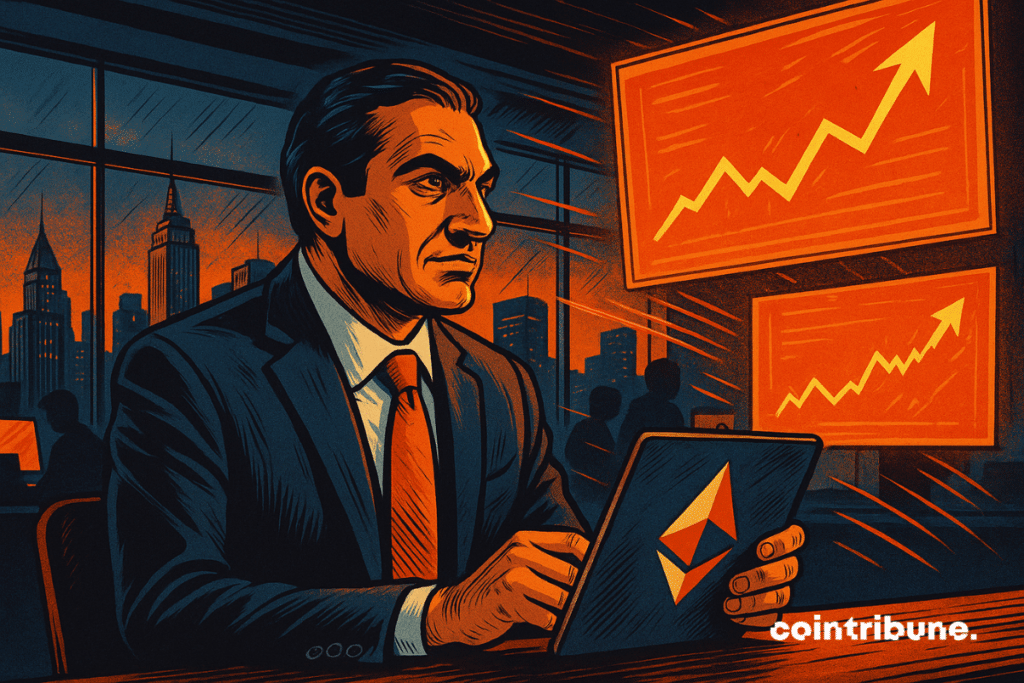Vivek Raman Compares Ethereum To Oil To Entice Wall Street
Vivek Raman, co-founder of Etherealize and former Wall Street banker, is leading an unprecedented charm offensive. He now presents Ethereum as the “digital oil” destined to revolutionize traditional financial institutions.

In brief
- Vivek Raman, ex-banker and co-founder of Etherealize, presents Ethereum as the Wall Street ‘digital oil’.
- This analogy complements Bitcoin as ‘digital gold’, but has certain technical limitations.
- The tokenization of real assets could make Ethereum the neutral benchmark asset of the modern financial system.
The “digital oil” analogy: attractive but imperfect
Vivek Raman, former banker at Nomura and UBS, launched Etherealize in January 2025 with a clear mission.
This co-founder is leading a charm offensive with financial institutions to convince them to adopt Ethereum. “I still call it digital oil“, he confides.
We believe that with the evolution of the crypto ecosystem, people will want to hold this asset as a reserve.
This analogy is directly inspired by bitcoin, often called “digital gold.” It makes Ethereum accessible to Wall Street newcomers.
The idea is simple: just as oil fuels the global industry, ETH fuels the blockchain network. It serves as fuel for all transactions and smart contracts.
However, fundamental differences emerge. Unlike oil, whose supply remains elastic according to demand, Ethereum has a maximum issuance of 1.5% per year.
“Rather than a fixed total supply cap, there is a fixed annual issuance cap“, clarifies Danny Ryan, co-founder of Etherealize and former researcher at the Ethereum Foundation. This predictability reassures institutional investors used to assets with clear rules.
The most striking advantage of Ethereum lies in its ability to generate income. Unlike oil stored in reserves, ETH “staked” on the network currently yields 3% per year. This passive income naturally attracts institutions seeking regular returns.
Ethereum, future reference asset of tokenized finance
The real revolution of Ethereum lies in the tokenization of traditional assets. BlackRock and Franklin Templeton have already taken the step by tokenizing several of their funds on this blockchain. This institutional adoption is expected to accelerate under Donald Trump, known to be favorable to cryptocurrencies.
Admittedly, competitors like Solana are nibbling away market share. Kraken has even chosen this blockchain for some of its offerings. But Ethereum maintains a lead thanks to its maturity and proven security.
Raman goes further in his vision. “In this ecosystem where all global assets are tokenized, the only neutral and global asset that connects all these assets is ETH“, he asserts. This perspective turns Ethereum into the backbone of the digital financial system.
Concretely, ETH would serve as a universal exchange currency between different tokenized assets. Stocks, bonds, commodities: all these traditional assets could be traded via Ethereum. This interconnection would create a truly global digital economy.
The “digital oil” analogy finally makes complete sense. Just as oil revolutionized industry in the 20th century, Ethereum could well transform 21st-century finance. Experts anticipate that tokenization of stocks will surpass $1 trillion in the medium term. Wall Street is gradually discovering this infrastructure, which will likely become the backbone of tokenized finance.
Maximize your Cointribune experience with our "Read to Earn" program! For every article you read, earn points and access exclusive rewards. Sign up now and start earning benefits.
Passionné par le Bitcoin, j'aime explorer les méandres de la blockchain et des cryptos et je partage mes découvertes avec la communauté. Mon rêve est de vivre dans un monde où la vie privée et la liberté financière sont garanties pour tous, et je crois fermement que Bitcoin est l'outil qui peut rendre cela possible.
The views, thoughts, and opinions expressed in this article belong solely to the author, and should not be taken as investment advice. Do your own research before taking any investment decisions.